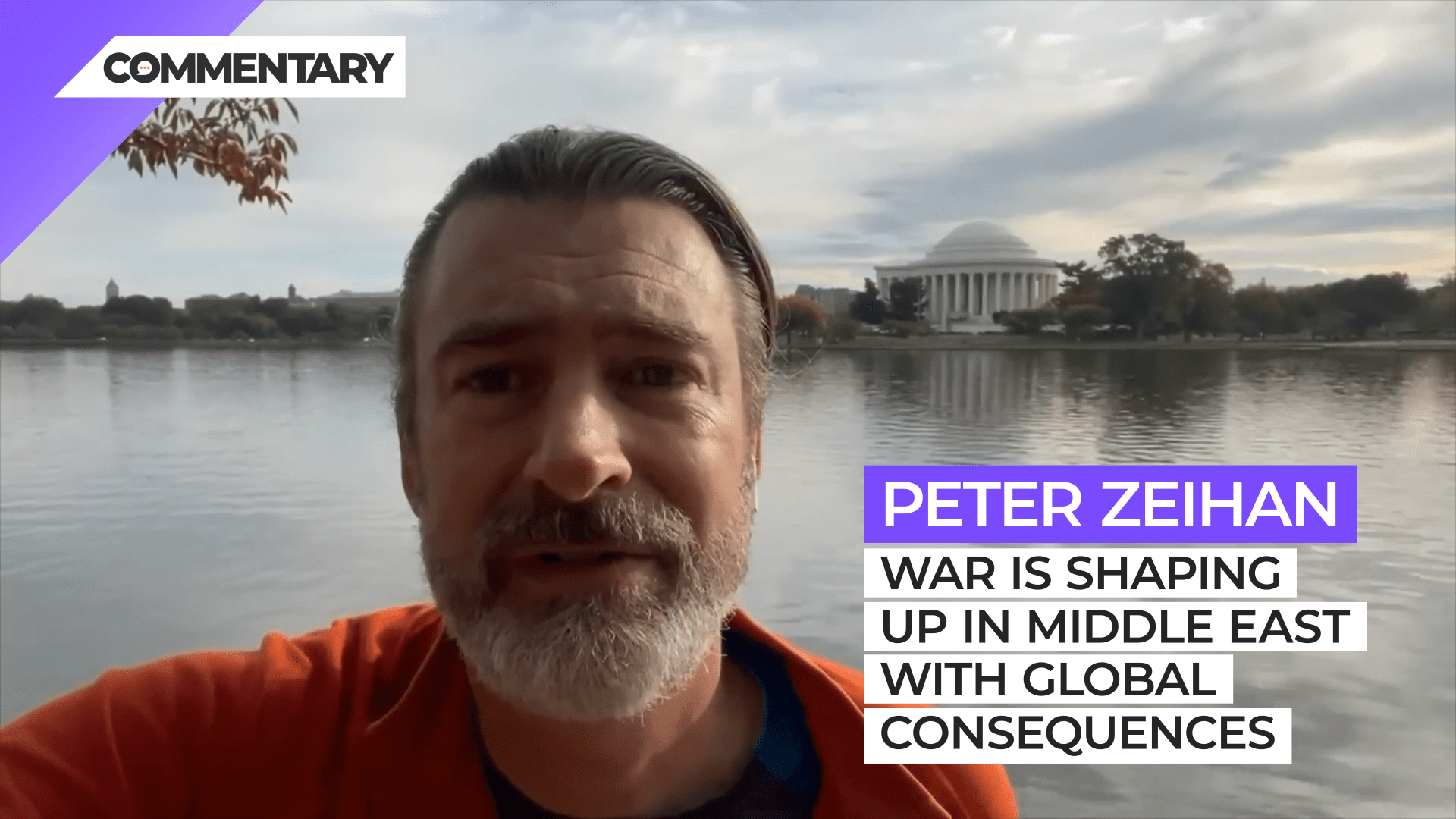
Commentary
-
Our commentary partners will help you reach your own conclusions on complex topics.
Hi, everyone, Peter Zeihan here coming to you from the reflecting pool in DC, which is opposite the Jefferson Memorial, which is probably my favorite of the memorials, and Jefferson, my favorite president.
So I thought it’d be a good backdrop to talk about perhaps the world’s most un-Jeffersonian leader, and one of my least favorite people,
Mohammed bin Salman, the Crown Prince of Saudi Arabia. Now, Mohammed bin Salman is the best way to put this, he’s the quintessential millennial. He’s entitled. He gets very disappointed and a little pouty when he doesn’t get his way.
But he also is very good at managing people. And that means that even though he’s every bit as much of a dictatorship, as Xi Jinping in China, or Vladimir Putin in Russia, he’s much more successful. He’s able to actually run people effectively, have conversations with them, manage some of the details.
And the job that he has to do is a lot easier than either of those two mega states. Saudi Arabia has a mid size population, you’re really only talking a little more than 30 million people. And it’s a one horse show when it comes to the economy. It’s really just oil.
And especially if you’re bringing in people to work the oil fields for you, you get to decide policy and foreign policy and strategic policy and general direction, but the details are handled by competent people. So a dictatorship can work in a place like Saudi Arabia, where it’d be far more difficult in a place like China or Russia.
So a little bit of background about how he got there.
Over a century ago, the tribe of Saud, which ultimately MBS is descended from, cut a series of deals with the merchants who control the cities on the West Coast. Now, at the time, we’re talking pre-industrial here, so the tribe of Saud was basically a bunch of desert Raiders, whereas the folks on the coast saw themselves as more sophisticated, and that’s pretty much accurate.
And the deal that was cut was that social policy and political policy would be set by the tribe, whereas the folks on the coasts would handle all the trade and all the economics. It was a good deal for both. And to be perfectly blunt, the folks on the Coast got the better part of the deal.
But then after the 1920s, oil was found in the interior, and all of a sudden the tribes had more money than they knew what to do with and they took over completely, isolated the coast and, in essence, the tribe of Saud became the House of Saud. So you got these people descended from Desert raiders who are hyper violent, who all of a sudden had more money than God and could impose whatever whim they had upon the world.
For a long time, the leadership of Saudi Arabia were a series of Kings, princes elevated to King, called the Sidari Seven, seven brothers all born from the same wife of the initial king of Saudi Arabia.
But they ruled until they died, and they were all more or less the same age. And so they were getting older and older and older and more and more decrepit. So it became very clear in Saudi Arabia that they needed to skip a generation and they eventually settled on Mohammed bin Salman as the crown prince, and he’s basically the king now.
Now he is a millennial, he is young, which means assuming he’s not assassinated, always a risk, he is likely to be the king of Saudi Arabia for the next 50 years.
So Saudi Arabia has something that the Russians and the Chinese will never have – continuity of government while controlling a resource that no one can do without, because it’s not an issue of relocating the manufacturing base, you either have the oil, or you don’t. So this is a country that is long for this world. And as such, the ambitions of Mohammed bin Salman and the goals of Saudi Arabia are not simply fused, they matter on a global scale.
And by far, the country that has the most to be concerned about because of this is Iran who the Saudis have always seen as their primary rival. Now, the Iranians, for their part, have a culture that stretches back over 1000 years. They say over 3000, and it’s not a ridiculous claim.
Now this, the Iranians have all kinds of problems, but I think their biggest one is that cultural history gives them a degree of arrogance. And so they’ll just look down on the Arabs. But then here you have Saudi Arabia with a significantly larger economy, who has better relations with the United States, with Japan, with China, with the United Kingdom, with France, with Turkey, with all of the world powers, because ultimately, the Saudis have something that they all need.
Which means in a post-American Middle East, the question isn’t, will the Saudis try to take out the Iranians? It’s how many allies will they be able to rally to do it for them? And as we get into a bigger and bigger energy crisis globally,
MBS’s goal of completely destroying the Iranian state, all of a sudden looks a lot more feasible. It is easy for the Iranians to close the Strait of Hormuz and restrict energy flows to the rest of the world.
But it would be a snap for the Saudis to do it. And unlike the Iranians, the Saudis actually have other outlets. They can get over half their crude out via pipe to the Red Sea and ignore anything that happens [unintell].
So a war is shaping up in the Middle East that is going to be globally consequential, and with the United States no longer on scene, it all comes down to the ambitions and the foibles of a guy who thinks it’s okay to take a hacksaw to journalists who write things about you that are not sufficiently flattering.
Fun times ahead. Alright, see you soon.
-
Hurricane Helene hits US coast, Appalachia and beyond
Hurricane Helene hit Florida and Georgia overnight between Sept. 26 and 27 as a Category 4 hurricane, and accompanying storms will continue reaching deeper into the continental United States today. Dangerous flash flooding from the hurricane, known as storm surge, was some of the worst flooding that the Tampa Bay area has ever seen, and… -
Israel holds upper hand against Lebanon, Hezbollah and Iran
On Wednesday, Sept. 25, Hezbollah launched a ballistic missile at Tel Aviv in retaliation for Israel’s explosive pager attack that blew up devices across Lebanon. Although Israel’s defense systems intercepted the surface-to-surface missile, the attempted strike on Tel Aviv marked a significant escalation by Hezbollah. Since the siege on Gaza began, shortly after the Oct. 7, 2023,… -
The Sinaloa Cartel civil war
Fears of a civil war within the Sinaloa Cartel are growing as violence between competing factions within the cartel continues. The Mexican Army has dispatched around 600 elite troops to Sinaloa to help quell those fears, in addition to roughly 2,200 regular soldiers and National Guard. Watch the above video as Straight Arrow News contributor… -
New Ukrainian weapons hit Russia where it hurts
Ukrainian drones struck a major Russian ammunition depot, triggering a massive explosion that was captured on camera. According to the Ukrainian military, 2,000 tons of munitions had arrived at the depot before the attack. Over the past two years, Ukraine has significantly increased its domestic drone production, allowing it to scale up attacks on military… -
Weighing social costs vs. economic benefits on immigration
Global human migration is one of the defining elements of our current historical era, according to the United Nations. Migrants face both the incentives to leave — forced out by climate change, crime and corruption, extreme poverty or violence — and incentives for where to go, based on available job opportunities and so on. Migration…
Latest Stories
-
 SRC Defense
SRC Defense
The warfare potential of SRC’s Ghost Mantis: Weapon of the Week
-
 Rheinmetall
Rheinmetall
US Army continues modernization with new IFVs on the way
-
 DVIDS
DVIDS
Transforming the Army’s front lines: Weapons and Warfare
-
 Getty Images
Getty Images
Pirate treasure: Kid finds phenom Paul Skenes’ rookie baseball card
-
 Reuters
Reuters
2K migrant caravan begins journey to US amid new Trump border security orders
Popular Opinions
-
In addition to the facts, we believe it’s vital to hear perspectives from all sides of the political spectrum.
Latest Opinions
In addition to the facts, we believe it’s vital to hear perspectives from all sides of the political spectrum. We hope these different voices will help you reach your own conclusions.
The opinions published in this section are solely those of the contributors and do not reflect the views of Straight Arrow News.





















Latest Commentary
We know it is important to hear from a diverse range of observers on the complex topics we face and believe our commentary partners will help you reach your own conclusions.
The commentaries published in this section are solely those of the contributors and do not reflect the views of Straight Arrow News.
Dr. Frank Luntz
Pollster and Political Analyst‘A disturbing pick’: Americans debate Musk, Trump’s cabinet picks
‘Dysfunctional’: Americans share criticisms of Congress
‘Instill optimism’: Americans on how future generations can succeed